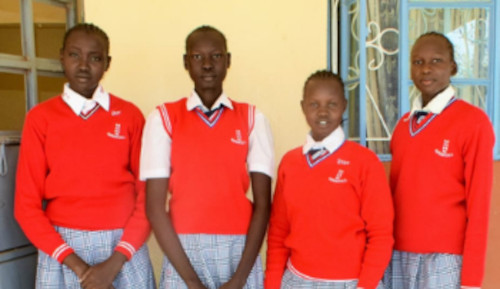On a Saturday afternoon in North Western Sydney a church hall of women sit at tables, listening to a tall woman, dressed in brightly coloured robes talking about her life and passion. Soon they’ll gather around a table covered with delicious food, but first Aduk Dau is being interviewed by her close friend Belinda, about experiences that are beyond the understanding of many people in the room.
Aduk talks about her idyllic childhood in what is now South Sudan, moving between a comfortable life in town, where her father was a renowned educator, and the family’s country property. She explains Sudanese marriage customs, explaining how when as a young woman she moved to live with her husband’s family she was accompanied by women from her family who helped her settle into her new role. Suddenly her narrative shifts as she explains how she was separated from her husband when the town was attacked in the brutal Civil war. Later she is separated from her mother and one year old son, when her family’s home is attacked. Alone Aduk set out by foot for Ethiopia. Aduk described how she joined up with other refugees along the road, following Sudanese custom, and how, bereft of her own child, she started keeping an eye out of children who were separated from their parents.
Reunited with her husband in Ethiopia, they returned to Sudan, but further attacks meant they again left their country by foot, finally arriving in Kenya. At Kakuma refugee camp, Aduk continued to watch out for unaccompanied children, who had been separated from family. Amazingly UN staff locate her mother and son in Uganda and they are reunited. She was given a job by the UN, particularly focusing on the arduous but essential process of ensuring children could access their vital identity papers when they had the opportunity to be resettled in the United States. In 2016 Aduk visited the United States and met up with some of these ‘Lost Boys’, now adult citizens establishing their lives and families.
Aduk’s family were granted humanitarian entry to Australia in 1999. Aduk had to leave her mother, not knowing if she would see her again. Her mother told her that wherever she went, she should go to church, and there she would find family. Sudan has a long history of Christian believers that extends back to the second century AD.
Following her mother’s advice, Aduk came to our church at St James Croydon in inner west Sydney, and we became friends. I helped Aduk leverage her voluntary support to other Dinka speakers into approval as an interpreter, and when, one time I needed a Dinka interpreter in my work, to both of our surprise, Aduk was the interpreter on the phone. Later Aduk was able to help other family members, including her mother, to migrate to Australia. Over the last ten years she has told her story repeatedly for both refugee and health agencies, to help people in Australia better understand what it means to be a refugee. She does this graciously, but it’s never easy to relive the worst days in your life in public.
Aduk learnt from her father the importance of education and has encouraged her six children to make the most of the education opportunities available to them in Australia. She never forgot the children of Kakuma. Their children and grandchildren are still living in Kakuma, unable to go home to Sudan, and so far unable to resettle elsewhere. Kakuma is one of the largest refugee camp in the world, with close to 200,000 residents. Education at Kakuma finishes in Year 8, so few children can access further education.
Aduk set up a project to help children in Kakuma access higher school education focusing on children from Jonglei, her home District in Sudan. She uses her local contacts to identify children and fund boarding school enrolments. To their credit, Anglican Aid partner with her, to help her manage the rigorous requirements for tax deductibility. Currently thirteen children, girls and boys are part of the scheme. Aduk points out that the children inevitably are motivated to further their studies in the hope of one day returning to Sudan, and contributing to their community.
As well as support from individual donors Aduk works tirelessly to fund raise for the scheme – hence afternoon tea on an Autumn Saturday at her local church organised with the help of fellow parishioners lead by Belinda and accompanied by her mother and other family members. Paul in Galations tells us whenever we have the opportunity to do good, especially those in the household of faith. Aduk’s passion reminds me that while she works hard to sustain her project, thanks to global communications it has never been easier for me to do good for others.
To support the Lost Children of Jonglei: https://anglicanaid.org.au/projects/lcoj-scholarships/
For information about nglican aid https://anglicanaid.org.au
Once a refugee herself, Aduk Dau fundraises for the children stuck in refugee camps

